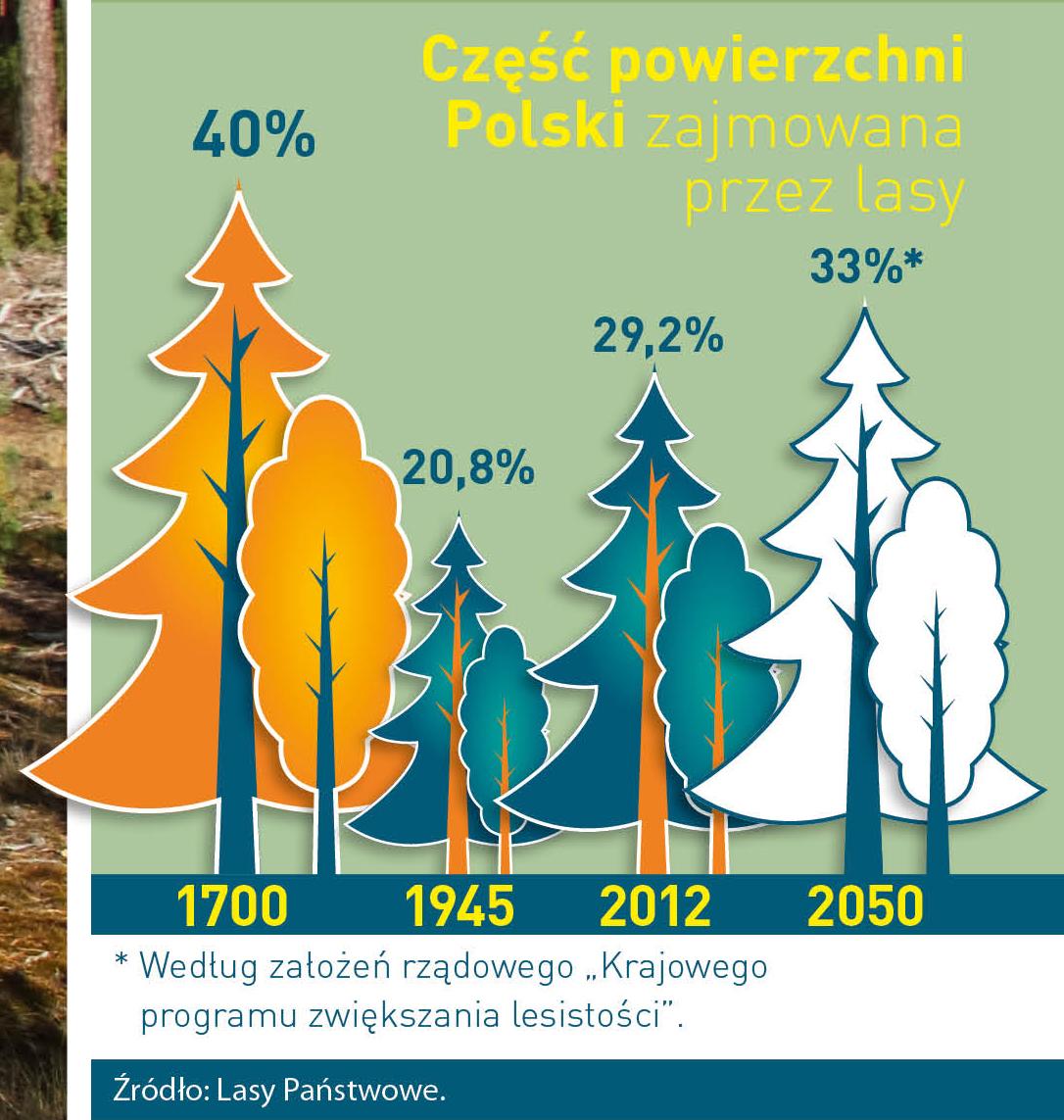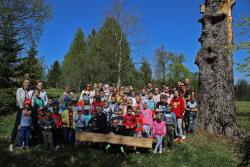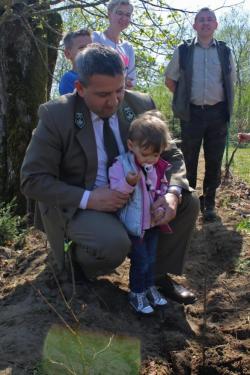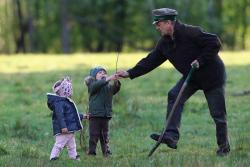 Asset Publisher
Asset Publisher
Polish forests
Poland is in the European lead, while concerning the area of all forests. They cover about 29,2 % of the country territory, and grow within the area of 9,1 million hectares. The overwhelming majority of the forests is state owned, of which almost 7,6 million hectares are managed by the State Forests National Forest Holding..
The number of Polish forest is still growing. The forestation rate of the country has increased from 21 % in 1945 to 29,2 % at the moment. Between 1995 and 2008, the forest area increased by 310 thousand ha. The basis for afforestation works is the "National Programme for Increasing the Forest Cover" (KPZL), assuming an increase of the forestation rate up to 30 % by 2020 and up to 33 % by 2050. Polish forests abound in flora, fauna and fungi. 65 % of the total number of animal species live there.
The forests grow in our country on poor soils, mainly because of the development of the agriculture in previous years. It influences the distribution of the types of the forest sites in Poland. Over 55 % of the forest areas is covered with coniferous forests. In other areas, there are forest sites, mainly the mixed ones. Their small part constitute alder and riparian forests – not more than 3 %.
In the years 1945 – 2011 the area of natural deciduous tree stands within the area of the State Forests National Forest Holding increased from 13 to 28,2 %.
Within the lowlands and uplands the most often occurring tee species is pine. It covers 64,3 % of the forest area of the State Forests National Forest Holding and 57,7 % of private and commune forests. In the mountains the predominant species is European spruce ( in the west) and European spruce with beech (in the east). Domination of pine is the result of carrying on sustainable forest management in the past. Once, the monocultures (crops or cultivations of one species) were the answer to the great demand of industry for wood. Such forests appeared to be quite fragile to climatic factors. They also were often the prey of pests' expansion.
In Polish forests, the share of other tree species, especially deciduous trees have been systematically increasing. The foresters have stepped aside from monocultures – that is why, they try to fit specific species of the forest stand to the natural stand, that would be proper for the given area. Thanks to that, in the years 1945 – 2011, the area of the deciduous tree stands within the lands of the State Forests National Forest Holding increased from 13 to 28,2 %. There occur more and more frequently the following tree species: oaks, ashes, maples, sycamore maples, elms, but also birches, beeches, alders, poplars, hornbeams, aspens, tilias and willows.
Our forests are the most often represented by the forest stands aged 40 to 80 years. The average age of the forest equals 60 years. More and more trees are of big size at the age over 80 years. Since the end of the Second World War, the forests' area has increased up to almost 1,85 million hectares.
Raport o stanie lasów w Polsce 2012
 Asset Publisher
Asset Publisher
 Asset Publisher
Asset Publisher
JEDNO DZIECKO, JEDNO DRZEWO I TYLE RADOŚCI
JEDNO DZIECKO, JEDNO DRZEWO I TYLE RADOŚCI
W ostatnim dniu kwietnia, na terenie Szkoły Podstawowej w Wałdowie, odbyła się akcja pod hasłem „Jedno Drzewo – Jedno Dziecko”. Do akcji zaprosiliśmy uczniów szkoły, grono pedagogiczne, rodziców i zaprzyjaźnionych strażaków z OSP w Wałdowie. Pani Dyrektor – Anna Palińska, jak zwykle, z pełnym zaangażowaniem przyjęła zaproszenie.
Przed przystąpieniem do akcji, Nadleśniczy – Szymon Należyty, powitał serdecznie wszystkich zebranych. Wspomniał, że sadzenie drzew, to dla leśników chleb powszedni. Kiedy powiedział, że leśnicy w Nadleśnictwie Dretyń sadzą rocznie około milion drzew, zdziwienie na twarzy zebranych było bardzo widoczne, również wśród grona dorosłych. Po krótkim wprowadzeniu udaliśmy się na boisko szkolne.
Dzieci, od najmłodszych przedszkolaków, po najstarszych uczniów klasy szóstej, chętnie posadziły swoje drzewka. Sadzonki buka, rozchodziły się, jak przysłowiowe ciepłe bułeczki. Każde dziecko chciało posadzić „swoje drzewko”, aby móc je później doglądać i pielęgnować. Oprócz 150 buków, posadziliśmy dodatkowo, wspólnie z gronem pedagogicznym i przedstawicielami Rady Rodziców, jeszcze kilka dębów i lip, oraz znaczną ilość krzewów. Dzieci chętnie oznaczały „swoje” drzewka z nadzieją, że za kilka lat będą się mogły pochwalić swoim dokonaniem. Zaangażowanie dzieci przeszło oczekiwania leśników i wkrótce się okazało, że obsadzenie boiska szpalerem bukowym potrwało tylko nieco ponad godzinę. Choć pogoda, jeszcze dzień przed akcją, była dość kapryśna, to już podczas naszego spotkania dopisała bez zastrzeżeń. Piękne słońce przyświecało dziatwie, która z uśmiechem brała udział w akcji.
Nad całością czuwał miejscowy leśniczy – Sławomir Mnich. Swoją radą służył zastępca nadleśniczego – Krzysztof Rydel, który również zadbał o wspomnienia, nagrywając kronikę wideo z imprezy. O bezpieczeństwo zadbał Tomasz Biernacki – strażnik leśny, oraz druhowie z OSP w Wałdowie, którzy na koniec podlali nasze drzewka z zastosowaniem kurtyny wodnej. Oprócz wymienionych, szpadlami operowali również inżynierowie nadzoru – Krzysztof Sokal – organizator i koordynator akcji, oraz Marcin Kowalski.
Po posadzeniu drzew, zawieszona została pamiątkowa tablica z wygrawerowanym tytułem akcji, oraz zrobiono wiele pamiątkowych zdjęć. Impreza przyciągnęła zainteresowanie lokalnych mediów. Wspólnie z nami, miło spędzali czas przedstawiciele Gazety Miasteckiej i Głosu Pomorza. Jak to bywa, podczas imprez organizowanych przez Nadleśnictwo Dretyń, nie obyło się bez ogniska i pieczonych kiełbasek, które znikały w podobnym tempie do sadzonych drzewek. Uśmiech dziecka, połączony z przyjemną akcją edukacyjną, mile spędzony czas i odrobina zabawy, były dobrym początkiem rozpoczynającego się długiego, majowego weekendu. Jesteśmy przekonani, że to nie była ostatnia wspólna akcja zorganizowana wspólnie ze szkołą z Wałdowa i okolicznymi dziećmi.
tekst Marcin Kowalski
foto Krzysztof Sokal


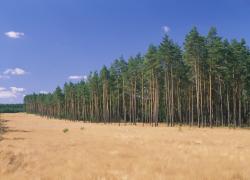 fot. Paweł Fabijański
fot. Paweł Fabijański
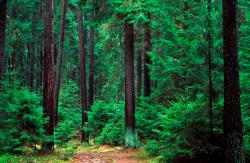 fot. Paweł Fabijański
fot. Paweł Fabijański
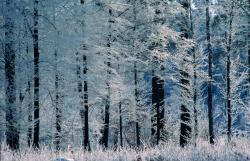 fot. Paweł Fabijański
fot. Paweł Fabijański
